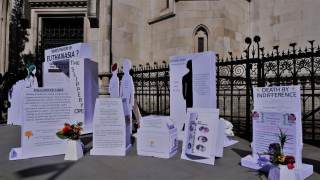Government lawyer: assisted suicide should be a matter for parliament
Published: May 4th, 2018



Judges considering a case relating to assisted suicide have been told that it should be a matter for parliament.
Noel Conway, who has Motor Neurone Disease, is appealing to the court to allow him to receive medical help to end his life.
Lawyers representing the Justice Secretary argued that for Mr Conway’s request to be granted there would need to be a change in the law, which should be decided in Parliament.
"…as with other cases where similar issues have been addressed, the respondent's opposition to the appeal is based on an application of the law both procedurally and substantively,” said James Eadie QC. "Any change in the law ought to remain a matter for Parliament."
A group of disability campaigners gathered outside the Royal Courts of Justice on Wednesday to protest the appeal.
The group, from The Distant Voices UK, a disability group campaigning for better end of life care, set up a graveyard outside the court to raise awareness of the risks associated with legalising assisted suicide.
One of the organisers of the protest, Nikki Kenward, has Guillain-Barré syndrome, an auto-immune disorder that can lead to paralysis. She believes that if Mr Conway’s appeal is successful the consequences for her and other disabled people would be significant.
“Should Mr Conway win his case it will change my life forever,” she said. “As a disabled person I am only too aware that some people see me as having no quality of life.
“A friend, who has cerebral palsy, and I, were once told by a youth worker, ‘If I were you two I’d rather be dead.’ Please don’t tell me I will not be vulnerable if euthanasia is legalised.”
Christian Concern is part of Care Not Killing, an alliance of organisations which oppose assisted euthanasia and assisted suicide which presented detailed evidence to the court. Care Not Killing's Campaign Director, Dr Peter Saunders, spoke to Sky News about the dangers for vulnerable people if Mr Conway’s appeal is successful.
“It is impossible to pass a law which will keep vulnerable people safe,” he said. “…if the law were to change, vulnerable people – those who are elderly, sick, depressed or disabled, would feel under pressure to end their lives so as not to be a burden on family or friends or caregivers.
“The evidence from other jurisdictions… which have had long runs with this kind of legislation, demonstrates that there is collateral damage and that vulnerable people, those who have no voice, are in danger of losing their lives by those who would want to exploit or abuse them.”
Mrs Kenward’s husband and carer, Merv, was also present at the protest and spoke of his concerns regarding the proposed changes to the law.
“As a carer, one of my greatest fears is what will happen to Nikki if I’m not here to care for her,” he said. “When I consider the dreadful alternatives that are available, including the looming possibility of [assisted suicide], I am reminded that those around me have a willingness to see her as a burden, living a life that they would not choose. I worry for her, I have a knot in my stomach when I think of what I know is possible.”
The appeal concluded on Thursday, and judgment is expected soon.
